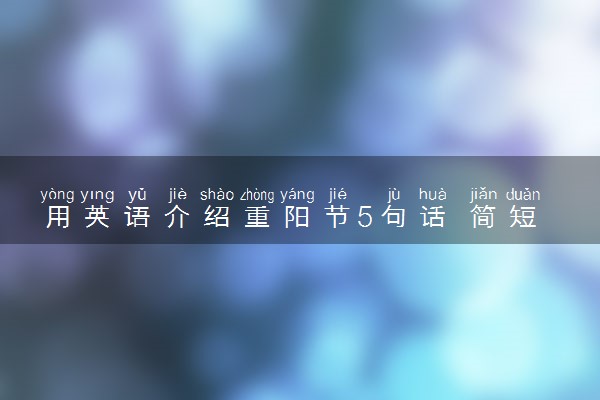重阳节,是中国传统节日,节期为每年农历九月初九。古时民间在重阳节有登高祈福、秋游赏菊、佩插茱萸、拜神祭祖及饮宴祈寿等习俗。那么用英语怎么介绍重阳节呢,一起来看一下!

如何用英语介绍重阳节
The Double Ninth Festival, the annual the 9th day of the ninth month of the Chinese lunar calendar day, is a traditional festival of the Chinese nation.
重阳节,为每年的农历九月初九日,是中华民族的传统节日。
In ancient times, there were customs of climbing high to pray for blessings, visiting chrysanthemums in autumn, wearing dogwood, offering sacrifices to gods and ancestors, and feasting for longevity.
古时民间在重阳节有登高祈福、秋游赏菊、佩插茱萸、祭神祭祖及饮宴求寿等习俗。
So far, it has added the connotation of respecting the elderly, enjoying the feast high on the day of the Double Ninth Festival, and being grateful to the elderly.
传承至今,又添加了敬老等内涵,于重阳之日享宴高会,感恩敬老。
Appreciation of the autumn and gratitude for respecting the elderly are two important themes of today's Double Ninth Festival.
登高赏秋与感恩敬老是当今重阳节日活动的两大重要主题。
英语介绍重阳节的范文
The 9th day of the 9th lunar month is the traditional Chongyang Festival, or Double Ninth Festival. It usually falls in October in the Gregorian calendar. In an ancient and mysterious book Yi Jing, or The Book of Changes, number "6" was thought to be of Yin character, meaning feminine or negative, while number "9" was thought to be Yang, meaning masculine or positive. So the number nine in both month and day create the Double Ninth Festival, or Chongyang Festival. Chong in Chinese means "double." Also, as double ninth was pronounced the same as the word to signify "forever", both are "Jiu Jiu," the Chinese ancestors considered it an auspicious day worth celebration.
第九个月的第九日是崇阳传统节日,或双第九节。它通常在阳历的十月。在古老而神秘的书易经,或易经,数字“6”被认为是阴阳性质,即女性或负,而数字“9”被认为是阳,男性或积极的意义。所以九号的月、日创造双第九节,崇阳的节日。冲在中国的意思是“双”。同时,由于双第九是发音相同的词来表示“永远”,都是“九,“中国人的祖先认为这是吉祥的日子值得庆祝